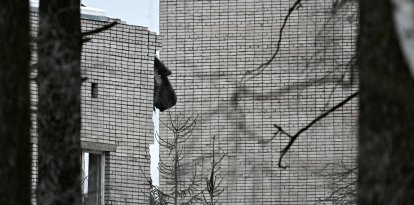Resounding victory for the conservatives and collapse of Macron's party after the first round of the legislative elections in France
As an alternative to RN, Le Pen's party, the progressive coalition 'New Popular Front' emerged, which displaced the French president's 'Ensemble' grouping to third place.

The leader Marine Le Pen celebrates the great victory of her party, National Rally (RN), in front of thousands of followers.
The conservative party National Rally (RN, by the French acronym of Rassemblement National) won this Sunday, June 30, a historic victory in the first round of the parliamentary elections in France, according to several exit polls that give the first place to the party led by Marine Le Pen.
According to polling data delivered by France Televisions and Radio France, RN was ahead in the first round, obtaining 33.5 % of the votes, a resounding triumph especially considering the high turnout at the polls in these elections, which exceeded the 65 % barrier, the highest turnout in the last 20 years, according to French media.
🗳️🇫🇷Elections #legislatives2024 : 1er tour
— Ifop Opinion (@IfopOpinion) June 30, 2024
Les estimations à 21H30 (France entière)
RN et alliés : 33,5%
NFP : 28,5%
Majo . Présid : 22,1%
LR et DVD : 9,7%
Reconquête : 0,7%@IfopOpinion pour @TF1 @LCI pic.twitter.com/Kvqck3cTrg
However, in addition to the victory of the conservatives, the other headline of the day was the collapse of the political party of President Emmanuel Macron, "Ensemble", which was displaced by the leftist coalition New Popular Front, which reached 29 % of the votes.
Once the first results were known, Le Pen addressed her supporters, who celebrated the historic electoral result with her. The French leader, reelected in her Hénin-Beaumonten constituency in this first round, called for an even higher turnout ahead of next Sunday's second round to generate a government coalition with no strings attached.
"Democracy has spoken and the French have put RN and its allies on top, practically annihilating Macron's camp," said an effusive Le Pen, who also appealed for the "restoration of unity and national concord" and called for the "return to fraternity" of the French people.
Right now, the French Congress is dominated by the Ensemble party, which has 245 deputies. It is followed by the left represented by the New Popular Ecological and Social Union (NUPES) with 131 legislators. Le Pen's RN, which moved from third to first place this Sunday, has 89 deputies, and the Republicans (center-right) reap 61, with everything given for them to remain stagnant as the fourth force after reaching 10% of the vote. The rest of the parties and coalitions have 51 seats.
However, RN's triumph this Sunday does not assure it, yet a clear government coalition is needed, especially if Macron and the leftist coalition form an alliance to counter RN and its allies.
Indeed, President Macron, who called these parliamentary elections unexpectedly last month after RN swept the European elections, said a broad coalition needed to be formed to curb the rise of the conservatives.
"We must vote for republican and democratic candidates," Macron said, referring to the July 7 runoff.
The French president also reemphasized again that, whatever the outcome of next July 7, he will remain in office until his presidential term expires in 2027.
Why is the RN's triumph resounding, but partial?
Although Le Pen's party managed to win for the first time in its history a first round, a milestone that confirms its undisputed and steady advance, the second round on next July 7 is the one that will really define the political landscape of the coming years in France.
Particularly, in these elections the French elect the 577 deputies of the National Assembly, who will hold office for 5 years. The candidates compete in total for 577 constituencies (electoral districts) that divide the country. In each district (province or region) a legislator is elected.
For a candidate to win in his or her constituency in the first round, he or she must win more than 50% of the votes (as Le Pen did). Otherwise, the election would go to a second round where the two most voted candidates and also the rest of the aspirants who have received more than 12.5 % of the votes compete. This is the case of many constituencies where, as announced by Macron's own party, alliances between centrists and leftists will be sought to face RN candidates.
So far, in the absence of official results, neither RN nor any other party or coalition can reach the magic number: 289 of the 577 seats, that is, absolute majority.
Therefore, Le Pen has appealed to heroics in the face of the second round, asking the French for one more vote of confidence to reach or approach the magic number and that would put her young ally, Jordan Bardella, who could be the next French prime minister if RN makes history next week, in a position of government.

























